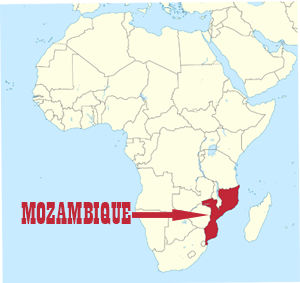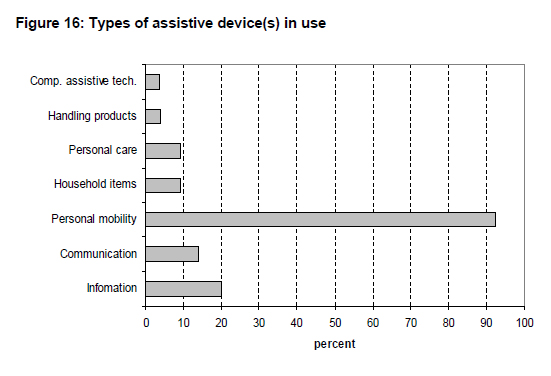 In
Mozambique, the Southern
Africa Federation of the Disabled (SAFOD) works with its national
affiliate, the Forum of Mozambican Associations of the Disabled (FAMOD).
The latter was born in 1998 as the umbrella of all DPOs in the country
with the technical support of SAFOD.
In
Mozambique, the Southern
Africa Federation of the Disabled (SAFOD) works with its national
affiliate, the Forum of Mozambican Associations of the Disabled (FAMOD).
The latter was born in 1998 as the umbrella of all DPOs in the country
with the technical support of SAFOD.
Officially, following the national census of 2007, the population was 20,366,795 inhabitants but current estimates point to about 25 million inhabitants. About 2.5% (475,011 inhabitants) of this population were considered to have some disability. However, the Sintef research estimated at 5.8% disability prevalence, of these 53% were men.
However, there is a general belief among
disability experts that the national census data may be far from being
true. FAMOD believes that there is no accurate information about
disability in Mozambique including, for example, the number of persons
with disabilities, age, sex and disability types.
Mozambique was one of the countries that
benefited from the representative studies on
Living Conditions of Persons with disabilities in Southern Africa
which was a result of an international co-operation between SAFOD,
Norwegian Federation of Organizations of Disabled Persons (FFO),
and SINTEF Unimed. The study brought to the fore the real situation of
Persons with disabilities. It was found that the largest number of
Persons with disabilities was made up of young people, adolescents and
children. They were the most disadvantaged. Women were doubly
discriminated against.
In terms of legal protection, the recognition
of sign language as an official language for the hearing impaired has
been cited as one of the achievements. In December 2009, the National
Council for Disability was established, and in June 1999 resolution on
disability policy was passed. The United Nations Convention on the
Rights of Persons with Disability (UNCRPD), which includes a whole
Article on assistive technology, had since been signed and ratified by
the Mozambique Government.
With regards to assistive technology, it is
reported that most AT supplies come from donors, and very few have
access to them. There are very few, if at all any, AT suppliers. ATs are
also acquired by the majority from the hospital through the Ministry of
Health at a small scale. The ministry also waits for donations from
their international partners.
The government only supplies crutches and
artificial legs and arms made from rudimentary materials. Other
categories of AT are critically invisible in Mozambique. This is partly
attributed to the long history of war that resulted in high numbers of
amputees. They seem to have overshadowed other types of disabilities.
Supply-chain related barriers (including transport logistics, among
other things) and cost-related barriers are rated highly by FAMOD on the
scale of critical challenges.

“Most of these devices have to be imported
from outside the country at very high prices. It happens that most of
the persons with disabilities are the poorest of the poor in Mozambique,
and they cannot afford to pay for these ATs,” says Kennedy Nhengu, FAMOD
Executive Coordinator and AT-Info-Map National Admin.
DPOs have been working with international
partners to supply ATs, but the government creates barriers though
imposing customs duty which DPOs are not able to pay. FAMOD itself has
been one of the beneficiaries of the assistive technologies donated by
charity organizations (crutches and wheel chairs). Like many other
organizations in the disability sector, they do not have the expertise
to deal with repair issues for broken ATs of their
clients/beneficiaries, so they refer all broken ATs to specialists.
“Repair is left to the owner of the device
since we have no expertise and necessary machinery to do the same,”
Nhengu adds.
Lack of repair expertise among non-profit
service organizations has proved to be costly on the part of their
clients. The majority of these continue to live on less than two dollars
per day despite the country enjoying more than 20 years of strong
overall economic growth since the end of its civil war, averaging over
7% per year, according to CARE International.
From a policy perspective, there is one piece
of legislation – The access to information for all – that includes
articles specifically on assistive technology related to information,
but FAMOD believes that persons with disabilities in general are not
enjoying this right.
However, there appears to be not much that
has happened with regards to policy and legislation related to
accessibility in general. Although, according to the Living Conditions
Study, 10 – 20% respondents stated that accessibility was a bigger
problem outside the households, with many important public and private
offices and facilities not being
accessible for a large group of
individuals with disabilities. Close to half reported
that hotels, work places, post offices and banks were inaccessible. To
some extent this might have reflected gaps in supply
and quality of assistive devices that
was also revealed through this study.
To address these age-old accessibility
challenges, persons with disabilities have advocated for a disability
law in Mozambique, which has now been designed with involvement of
persons with disabilities. As of March 2018, it was expected to be
presented in the House of Parliament at the earliest convenience. Most
disability experts and advocates hope that that when the law is finally
passed, it is going to be game-changer not only in the context of
protecting human rights of persons with rights from the litigation
perspective (as those who will be violating this law will, this time
around, be penalized by the law), but also in the context of making
accessibility for persons with disabilities an enforceable human right
enshrined in a proper law.
